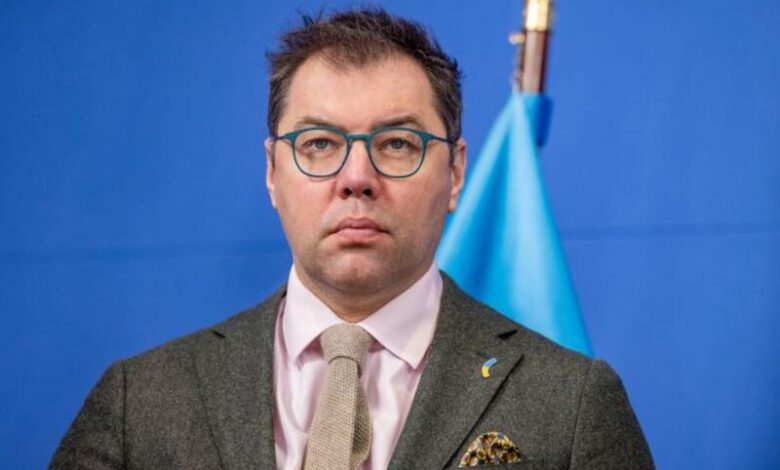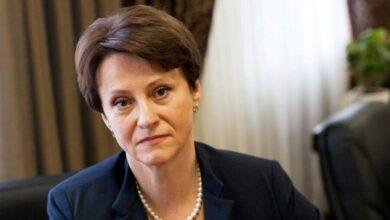Ukrainian Ambassador to Germany Oleksiy Makeyev spoke about Kyiv’s expectations, air defense systems, and the “competition” between German drones and iPhones

During the full-scale war, Germany ranks second after the USA among the countries that provide support to Ukraine. After the change in US foreign policy caused by the rotation in the White House, Berlin is likely to become the new leader in terms of aid. At the same time, the nature of German support is also changing. Ambassador of Ukraine to the Federal Republic of Germany Oleksiy Makeev believes, that these changes are not only quantitative, but also qualitative. He outlines several stages through which the awareness in Berlin of how to help the Ukrainian army passed, and reminds that three and a half years ago, Germany offered Ukraine only five thousand helmets. Against this background, the current level of aid is a radical shift. Makeev hopes that under the new chancellor, Friedrich Mertz, the support will become even stronger.
The ambassador notes that the atmosphere in Germany has radically changed within a hundred days of the new government. This concerns the attitude towards Ukrainian representatives from the government, ministers, embassy contacts. Makeev describes this atmosphere with the German word “aufgeschlossen”, which means openness, readiness for cooperation and dialogue. He observes exactly this openness in the relations between the president of Ukraine and the chancellor, the ministers of the two countries, as well as in his own contacts. This atmosphere of openness was characteristic of the current Minister of Defense Boris Pistorius even before the change of government. Pistorius has demonstrated this quality since the beginning of his ministerial term.
Makeev believes that the political vocabulary of the German leadership has also changed. In 2022, the key word in German politics was Zeitenwende, which means “turning point”. In 2023 — Krisenmodus, that is, a state of crisis. And in 2024, the phrase Ampel-Aus — the end of the traffic light coalition — came to the fore. He draws attention to the fact that none of these concepts reflected the leadership role that Germany is increasingly assuming. Only during the election campaign of Friedrich Merz did this word appear in public discourse — Führungsrolle, the role of a leader.
According to the ambassador, rhetoric about Germany’s leadership in Europe, in the world, regarding Ukraine is increasingly appearing in the statements of the new government. At the same time, there is disappointment in Ukraine due to Mertz’s refusal to provide Taurus missiles, despite the fact that he had previously promised to do so. However, apart from this issue, there are no serious grounds for accusing Germany of intransigence. If previously only the Minister of Foreign Affairs Annalena Burbok spoke about it, now it is the official position of the coalition. Germany already publicly declares Ukraine’s membership in NATO and that these declarations even precede the wording currently used by the Alliance itself. It is important that there is currently a dialogue between the Ministry of Defense of Germany, the defense industry of Germany and the Ukrainian side on the use of tactical and strategic lessons of the Armed Forces. This will contribute to even deeper integration of Ukraine into the Euro-Atlantic space.
Regarding the personal position of Chancellor Mertz, the ambassador notes that there is no reason to doubt his commitment to Ukraine’s membership in NATO. He names the key political figures in the German government — the minister of foreign affairs, the minister of finance, the vice chancellor, the minister of defense — and considers them absolute supporters of Ukraine, as well as his personal friends. Regarding their position on NATO, Makeev refrains from making assessments, but confirms their support for Ukraine. Our country cannot allow a repeat of the situation in 2023, when it was Germany, together with the United States, that blocked Ukraine’s advancement to NATO. He admits that other obstacles have appeared in the world, but emphasizes that as an ambassador he will work to ensure that there are no more obstacles on the part of Germany. An example of Germany’s leadership is its participation in the Rammstein format. After the USA withdrew from the coordination of this initiative, it was picked up by the Germans together with the British, and this happened thanks to the initiative of Minister Pistorius.
Another proof of leadership, according to the ambassador, is the participation of Germany in the air defense coalition. Germany transferred three Patriot systems to Ukraine, which is the largest contribution among all allies. In addition, it constantly supplies spare parts, additional launchers and missiles. Now the German government is ready to buy even more systems from the US, as well as unite other countries around a joint initiative.
The ambassador considers it important that the government canceled the defense spending limit. In the new draft budget for 2025, EUR 8.3 billion of aid for Ukraine has already been laid down. In previous years, only 4 billion was expected, and the increase was already in the course of parliamentary discussions. Now the amount is recorded immediately. In addition, similar amounts are planned for 2026 and 2027. Germany joined the so-called “Danish model” of aid to Ukraine. This is the first contract for the purchase of Ukrainian-made drones for the Armed Forces. Such drones are not produced in Germany itself, and production in Ukraine is much faster.
Makeev singles out several stages that Germany went through in its military aid policy. The first, zero stage is the proposal to transfer five thousand helmets to Ukraine. There was a scheme of “circular exchange” (Ringtausch), when Germany gave modern equipment to other countries in exchange for Soviet weapons for Ukraine. For example, it transferred the Marder BMP to Greece, and in exchange received the BMP-1 for the Armed Forces. The second stage was the direct supply of equipment from the arsenals of the Bundeswehr: Panzerhaubitze 2000, Mars MLRS, Dingo armored personnel carriers, Marder BMPs, Leopard tanks, as well as artillery shells and missiles. This stage has ended because the supply is exhausted. The third stage was the production of weapons specifically for Ukraine: IRIS-T air defense systems (seven of which have already been delivered), armored vehicles from FFG, wheel howitzers, reconnaissance drones from Quantum-Systems, which are now produced in Ukraine.
The current stage, according to the ambassador, is the purchase of weapons for the German budget in Ukraine itself, as well as joint production. Several joint ventures between Ukrainian and German companies have already been established. There is hope that the next step will be the production of joint products on the territory of Germany. Joint production of defense products between Ukraine and Germany may include not only drones, but also long-range missiles. Some Ukrainian developments already surpass the Taurus missile in terms of range, although they may be inferior to it in efficiency. But these issues currently remain the subject of separate negotiations.
The ambassador reports that direct contact has already been established between Ukrainian and German manufacturers. It was especially important to observe professional discussions at the level of CEOs of companies, in particular those specializing in long-range weapons. The participants of such conversations objectively discussed the technical possibilities of cooperation: what one side can provide, and what the other can refine. There is hope that within the scope of the tasks set by the President of Ukraine, in particular in the field of production of interceptor drones, long-range drones and FPV drones, new alliances will appear between Ukrainian and German enterprises of the defense industry.
Regarding medium-range air defense systems, the ambassador reports that a total of 18 IRIS-T SLM systems have been ordered. Initially, it was about 12 systems, later – about 4 more, and additionally – 2. To date, the Armed Forces of Ukraine have received seven of them. Makeev clarifies that each IRIS-T SLM system currently being produced for Ukraine in Germany includes three medium-range SLM launchers and two short-range SLS launchers. This is a full-fledged integrated complex. Patriot remains the most suitable system for effective destruction of ballistic missiles. Although, according to the Ukrainian military, there were isolated cases when IRIS-T shot down ballistic missiles, the purpose of these systems is different.
Speaking about Patriot, Makeev notes that Ukraine’s need for such systems is constant. Ukraine initially asked Germany to purchase two systems for it in the USA. After the last meeting in the Ramstein format, a public statement was made that the partners are trying to find five Patriot systems for Ukraine. However, Ukraine needs at least ten such systems. The figure of five or ten systems refers to the total pool of efforts of European countries that have undertaken to help Ukraine. Later, it will become known who exactly and to what extent contributed to the financing of these purchases. It is primarily about the production of new systems, but it is possible that some states will agree to hand over the existing systems earlier, receiving new ones after their production is completed.
Regarding the subject of Ukraine’s accession to the EU, Makeyev disagrees with the thesis of caution on the part of Germany. In response to the mention of Chancellor Merz’s recent statement in the Bundestag, where he spoke against the inclusion of Ukraine in the long-term financial framework of the EU until 2034, the ambassador notes that he intends to find out what exactly the head of government meant as soon as he returns to Berlin. I am sure that this statement does not mean that Germany does not want to see Ukraine in the EU until 2034. This approach does not correspond to the political style of the current government. Germany remains a supporter of the merit-based approach — an approach based on real achievements. This country has assumed the role of a leader in the process of European integration of Ukraine and coordinates this work with other partners, in particular in solving difficult issues, such as overcoming the veto of individual countries. According to the ambassador, the German side shows openness to Ukrainian initiatives and requests.
Speaking about the German side’s criticism of Ukraine’s domestic political decisions, Makeev admits that such issues as the rule of law and anti-corruption policy are fundamental for the European Union. These topics cannot be ignored in Berlin either. A country that assumes a leadership role in supporting Ukraine cannot turn a blind eye to the observance of basic principles. In this context, he mentions the law 12414, which caused concern among German partners, and expresses the hope that it will be repealed in the near future.
At the same time, Makeyev emphasizes that the future of the European integration of Ukraine is considered a priority in Germany. He mentions the agreement between the presidents of Ukraine and Germany to resume intergovernmental consultations, which Germany practices only with selected countries such as France, Poland and Japan. This format will contribute to the deepening of cooperation, and emphasizes that Ukraine strives not only to be a recipient of aid, but also to offer its own solutions to Germany. In particular, the experience of Ukrainian digitization should be mentioned as an example of what Ukraine can share. Makeev also emphasizes the unique tactical experience of the Armed Forces, which is already beginning to be integrated into the practice of the German army.
According to the ambassador, thanks to cooperation with Ukrainian manufacturers, German defense industry companies are also increasing their competitiveness. For example, the company Quantum-Systems, which has completely localized production in Ukraine. It not only produces, but also develops new models of drones directly on the spot. The pace of product updates at this company, according to the ambassador, exceeds the frequency of Apple software updates. It is this flexible and dynamic approach to development that is a new era in the defense industry. These are both reconnaissance and attack drones.





